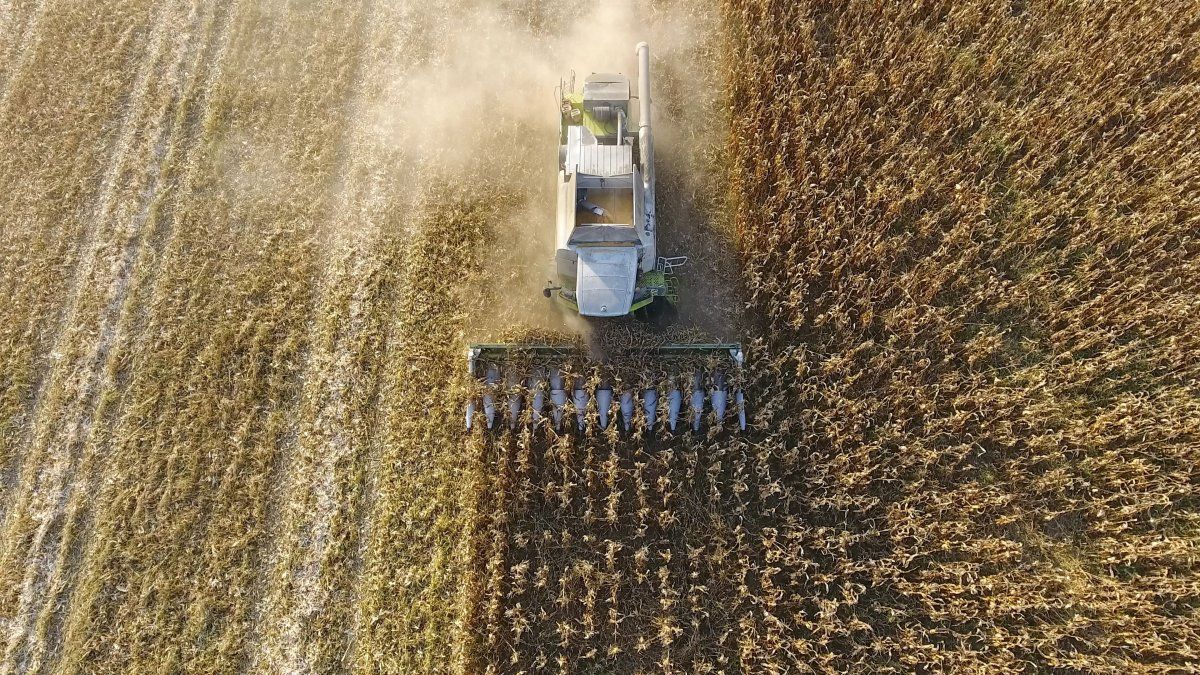The 2025 Budget Bill presented by the President Javier Milei estimates that Income from withholdings will doublemeaning that it will grow by more than 100%. This situation caught the attention of producers, analysts and economists, because for that to happen the peso would have to be devalued, grain prices would have to increase – something very unlikely although not impossible – or in any case the state would look for a new way of collecting using the DEX.
Although the technical teams that make up the Liaison Committee have begun to read the “fine print” of the project, there is a specific concern in the agricultural sector, since the sector contributes more than 80% of the total amount collected through this means.
To date, most of the withholdings are made up of 33% of soybeans, 12% of wheat and corn, 7% of sunflowers and 6.75% of beef, among other products that must pay export duties. According to the Ministry of Economy, the income from this tax would go from $5.34 billion to $10.7 billion, 100.4% more than the previous cycle.
The situation has raised concerns on social media, with economist Salvador Di Stefano questioning the budget figures. The Government’s response was not long in coming and was made by Luis Caputo himself (also via X), arguing that due to the editions of the popularly known soybean dollar implemented by Sergio Massa, the payment of certain taxes had been advanced, with which the jump in quantity would be produced by “a low comparison base.”
Javier Preciado Patiño, consultant and former official in the agricultural markets area, questioned Caputo’s response and explained to Ámbito that “there is no sign of a large advance in withholdings in 2023 that would lower the comparison base for 2025. Only corn advances half of the balance and largely after the runoff due to the fear of an increase in the DEX. In soybeans, which pay 33% and 31% and tend to be worth twice as much as corn, less than 20% would end up being advanced. As for wheat, practically nothing was registered for the 2023/24 campaign because DJVEs were rolled without being used. On the contrary, a good volume will be registered in November and December, so this cereal raises the comparison base.”
According to Patiño, Caputo’s arguments are unfounded because “a greater exportable balance is not expected to justify the doubling of DEX income, nor are prices expected to increase next year, and other sectors of economic activity are not expected to grow in their exports to significantly contribute greater revenue. In fact, the budget project itself reports that exports in 2025 will grow in value by 9% compared to 2024, making a 100% increase in DEX income impossible. Nor is it expected that revenue will increase due to devaluation, since a dollar at $1,207 by the end of 2025 rules out the intention of a devaluation shock.”
But this is not the only thing that “does not add up” for the agricultural sector. For the Confederation of the Third Zone (CARTEZ), an entity affiliated with CRA, patience is running out. In a statement, the entity highlighted the discomfort, bewilderment and stupor, in the face of the presentation of the Budget Bill for the year 2025 where “the export duties that weigh on agricultural products, far from disappearing or at least categorically decreasing, aspire to double their collection.”
This Tuesday, during the inauguration of the premises that the Argentine Angus Association owns in the Cañuelas Agricultural and Livestock Market, the Secretary of Agriculture, Sergio Iraeta, could not give further details on the matter. He only limited himself to explaining that “until we solve the macro and the variables of exchange rate, monetary emission and debt are not in order, we have to wait. There are no deadlines or dates. We have to achieve fiscal balance in order to begin to lower taxes. Once we achieve fiscal order, taxes will be lowered.”
There were also some expressions of hope regarding the direction proposed by the Government in the 2025 Budget. Alfonso Bustillo, president of the Argentine Angus Association, is optimistic about the future. When consulted by Ámbito, he defined himself as “an enthusiast” because “several things have changed.” He explained that “inflation has stopped, export quotas have ended, withholdings for cows, for dairy farming, and for livestock farming have been reduced by 3%. All we have ahead of us is hope, because if the macroeconomy does not improve, if finances are not put in order and if we have to continue borrowing or issuing to live, it will be very difficult. Livestock farming and production are stagnant, Argentina is stagnant. Poverty is structural and that is a tragedy, in a country that should be rich, it is poor. Hopefully these people can carry out what they think and change the lives of Argentines.”
Beyond wishes, reality is different. The 2024/25 agricultural cycle shows a wheat campaign that has started and several challenges facing the coarse sowing. Climate models indicate that for the rest of the year the forecast will be La Niña and if the rains are scarce the complexities can become suffocating: as far as soil moisture is concerned, there is nothing left in the east and in the western part of the central region there are signs of drought. International prices do not accompany and tighten the rope to the maximum, because in rented land -even in soybeans- the numbers do not add up.
The mood of the producers is no longer the same as in December 2023 and behind the gates, phrases linked to the dismay and lack of credibility in the Government are increasingly heard, words that for now do not resonate because the illusion and the belief that this administration is the last hope left for the countryside to have the tax pressure removed at the time when it needs it most win out.
Source: Ambito
I am a 24-year-old writer and journalist who has been working in the news industry for the past two years. I write primarily about market news, so if you’re looking for insights into what’s going on in the stock market or economic indicators, you’ve come to the right place. I also dabble in writing articles on lifestyle trends and pop culture news.




